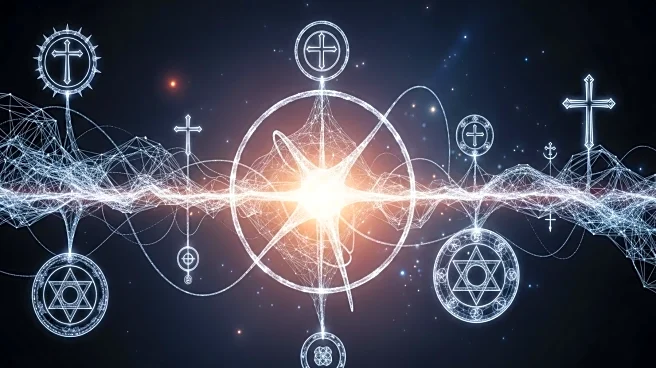What's Happening?
Geoffrey Hinton, often referred to as the 'Godfather of AI,' has been vocal about the potential dangers of unregulated artificial intelligence. After leaving Google in 2023, Hinton has expressed concerns about AI's rapid advancement and its portrayal using religious language. He is part of a growing group of tech figures who describe AI in divine terms, with some suggesting it could lead to a technological apocalypse. Hinton's warnings aim to alert the public to the risks of AI, encouraging political action to regulate its development. Despite these concerns, some tech leaders, like Anthropic CEO Dario Amodei, envision AI as a transformative force for good, predicting advancements in health, democracy, and poverty alleviation.
Why It's Important?
The discourse surrounding AI's development and its potential impacts is crucial as it influences public perception and policy decisions. Hinton's warnings highlight the need for regulatory frameworks to manage AI's growth and mitigate risks. The religious language used by some tech leaders underscores the profound impact AI could have on society, potentially reshaping human evolution and societal structures. This debate affects various stakeholders, including tech companies, policymakers, and the general public, as they navigate the balance between innovation and safety.
What's Next?
The ongoing conversation about AI's risks and benefits is likely to continue, with calls for regulation gaining traction. Stakeholders, including tech companies and governments, may need to collaborate on establishing guidelines to ensure AI's safe and ethical development. As AI technology advances, the public's role in pressuring politicians to act could become increasingly significant. The debate may also influence future investments and research directions in the AI sector.
Beyond the Headlines
The religious language surrounding AI reflects deeper cultural and philosophical questions about humanity's relationship with technology. This discourse may lead to ethical considerations about AI's role in society and its potential to redefine human identity and purpose. The conversation also touches on transhumanism, a concept that envisions merging human and machine intelligence, raising questions about the future of human evolution.









